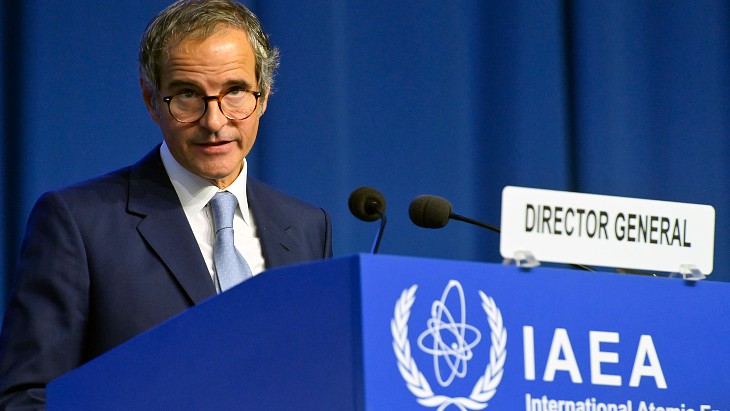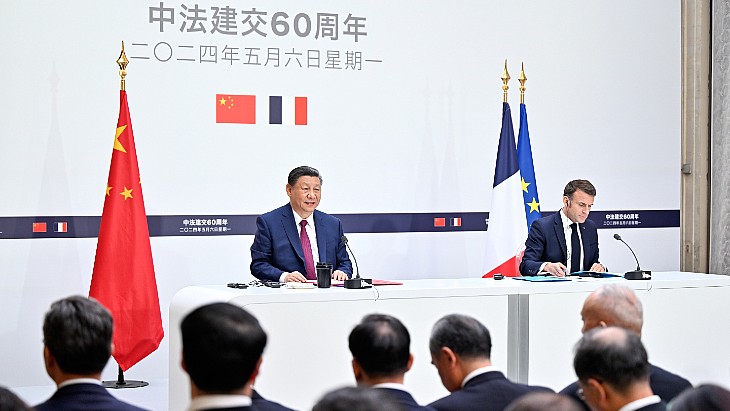Grossi stresses positive role of nuclear at IAEA General Conference

He said: "Our work in widening the access to life-affirming nuclear science and technology is happening against a background of seismic shifts in our climate. The horrifying consequences of global warming are becoming ever more apparent, from wildfires in North America, to heat domes, droughts and floods across Asia, Europe, Latin America, and Africa. Our climate emergency is undeniable, but so is our ability to do something about it.
"Four years ago, nuclear power was struggling to gain a place at the table in major global conversations and events on energy and climate change. Today, nuclear power not only has a place at the table but is increasingly recognised as part of the solution."
Speaking 70 years after the then US President Dwight D Eisenhower's Atoms for Peace speech to the United Nations which paved the way for the creation of the IAEA, he said that it continues to implement its safeguards and security work. He said that there was an "ever-learning mindset when it comes to building a culture of nuclear safety and security - nuclear energy is safer than it has ever been, safer than almost any other source of energy".
And he said: "In the past few years we have not been vocal enough about the benefits of nuclear power, but that page has been turned. Even as public opinion polls around the world show the tide turning in favour of nuclear energy, countries still need to engage stakeholders openly, and proactively, in their nuclear power programmes. Concerted effort and action are warranted."
Representatives of the IAEA's 177 Member States are attending the event, at which delegates will discuss a range of topics, from the 2024 budget to strengthening activities related to nuclear science, technology and applications, as well as the IAEA’s nuclear safety and security activities and strengthening the effectiveness and improving the efficiency of Agency safeguards. They will also specifically discuss nuclear safety, security and safeguards in Ukraine and safeguards in the Middle East and in North Korea. Thailand’s Ambassador and Permanent Representative to the United Nations, Vilawan Mangklatanakul, was elected as the president of the General Conference.
The opening session saw Grossi taking the oath of office for a second four-year term as director general. He said that since taking the job there had been the COVID-19 pandemic and then war in Europe: "These two events are tragic in and of themselves, but they also make it more difficult - and urgent - to tackle the ever-more-present calamity of climate change and the very serious challenges of poverty, disease, hunger and food, water and energy insecurity. I feel humbled and privileged to lead an institution with a unique mandate that allows us - everyone in this building today - to play a role in tackling these challenges."
The director general highlighted the work of the agency's staff in Ukraine, where experts are stationed at all the country's nuclear power plants, and there have been 10 rotations of staff at the Zaporizhzhia nuclear power plant, which has been under the control of the Russian military since early March 2022.
Grossi said the situation there remains "fragile". In an update published on Friday, the IAEA reported that there had now been 10 groundwater wells drilled "bringing the plant close to having a longer-term solution for the provision of cooling water" since the destruction of the Kakhovka dam in June. It said that an 11th well is due to be drilled after which the plant's operators hope they will have "the approximately 250 cubic metres of water per hour to maintain the cooling of the reactors and spent fuel pools in the current shutdown state".
The agency also said that staffing levels at the plant "continue to be a concern with a significant number of staff having left the ZNPP since the start of the armed conflict, including licensed operators from the main control rooms". The IAEA experts at the site, which is on the frontline between Russian and Ukrainian forces, also reported hearing "numerous explosions some distance away".









_88592.jpg)
_66488.jpg)

